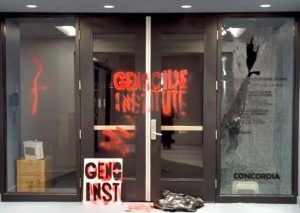Tel Aviv Mayor Ron Huldai amiably joked at a Toronto luncheon April 14 that the reason he’s “shlepping all over the world” is to find partners to help support Tel Aviv reach its full potential as a cosmopolitan and entrepreneurial centre.
Huldai was in Toronto to meet with the Tel Aviv-Yafo Foundation, his city’s international fundraising arm, of which he is chair, and which has offices in Israel, the United States, Canada, the United Kingdom and Germany.
The luncheon, held at the offices of the investment firm ReichmannHauer Capital Partners in First Canadian Place, was hosted by Toronto business leaders and philanthropists Justin Linden, Leerom Segal, Michael Serruya and Philip Reichmann, co-founding partner of ReichmannHauer Capital Partners.
READ: ‘THOUGHT LEADERS’ HEAR PREMIER DISCUSS MISSION TO ISRAEL
The event drew about 20 guests, including Israel’s consul general to Toronto and western Canada, DJ Schneeweiss.
Huldai, who was first elected in 1998 and is serving his fourth consecutive term, spoke about the creative and youthful energy that’s taken hold in Tel Aviv in the past two decades.
Not only has the number of young people doubled in recent years, with people aged 18 to 35 now comprising 33 per cent city’s of the population, Huldai said, but Tel Aviv has committed to fostering a culture that nurtures youth and their contributions to economic and cultural life, he said.
“We’ve been taking public spaces and transforming them into co-working spaces… and we were one of the first cities in the world to provide free Wi-Fi on the streets, on the beach, so people can sit anywhere and work.”
He noted that much of the money raised by the Tel Aviv-Yafo Foundation supports educational initiatives.
This environment, Huldai said, has helped establish Tel Aviv as a hub for Israel’s thriving start-up economy. In his introductory remarks, Segal said there are more than 1,000 start-ups in Tel Aviv alone, making it the largest per capita start-up centre in the world.
Huldai stressed that in addition to understanding the needs of Tel Aviv’s residents and giving them “the atmosphere or ecosystem that they need to live,” his mandate has been to emphasize Tel Aviv’s core values. “These are to be a bastion of democracy, pluralism, art, culture, science, research, rational thinking and a place that’s open to every minority.”
He cited as examples that Tel Aviv has been ranked among the top three most attractive tourist destinations and one of the “most gay-friendly cities in the world.”
To continue this work and to fully achieve what Huldai said is “our vision for the city,” Tel Aviv will need the support of international partners who can contribute to the Tel Aviv-Yafo Foundation through donations, collaboration on projects or by becoming a member of its board.
In a question-and-answer session, one attendee asked the mayor whether the city is interested in developing the area in south Tel Aviv near the boardwalk and nice hotels, which the attendee said is “like a slum.”
Huldai said that over the past 100 years, Tel Aviv’s more affluent residents have moved and built houses in the north part of the city, while people of lower socio-economic status have tended to live in the south.
He said that some development has started in south Tel Aviv, but more work needs to be done. “That’s part of the reason I’m here looking for partners… We haven’t achieved this yet.”
READ: A DRAMATIC INNOVATION IN THE CANADA-ISRAEL RELATIONSHIP
Another attendee asked about the influx of African migrants and how the municipal government is balancing what he called the “strain” on the city with its responsibility to help these people.
Huldai acknowledged the challenge, and said that 50,000 illegal immigrants currently live in Tel Aviv, that the cost to educate their children is high and that some of the migrants have clashed with Israelis in the neighbourhoods where they’ve settled.
“But we can’t ignore them,” he said, adding, “a human being is a human being. I don’t care if he’s legal or not, and we must do everything in our capacity to care for them… If we treat them well, it’s better for everyone in the city.”






